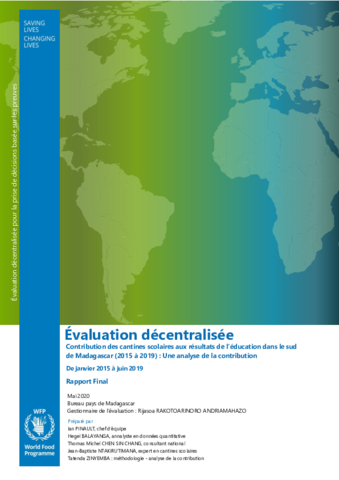
The evaluation was commissioned to assess the impact of school meals on key education outcomes and its contribution to related national priorities. The evaluation focused on assessing the relevance, effectiveness, efficiency, impact, sustainability of the school meals programme as well as analysing gender equality and women empowerment aspects. The overarching evaluation questions included: (a) How relevant is the school meals programme in the context of Madagascar? (b) To what extent was the programme implemented as designed – (considering factors enabling or constraining); and (c) To what extent does the consistent provision of meals at school contribute to primary school completion, attendance and retention?
Below is a sample of key evaluation findings:
- The WFP school meals programme is aligned to the National Programme Policy, especially the third version of the National Programme for Food and Nutrition Promotion in Schools (2020-2024).
- The school meals programme is relevant to the context of recurrent food insecurity affecting the southern regions of Madagascar although it does not fully meet the requirements for community ownership set out in the National School Feeding Policy (PNAS1) mainly due to limited technical and financial capacities are the local level.
- Key factors contributing to education outcomes (school attendance and retention) include the desire for a better future and investment decisions of parents, the competence of teachers and the quality of the school environment.
- The school meals programme improved the concentration of schoolchildren in class. However, the quantity of food delivered at each school was not enough to cover the needs of schoolchildren throughout the school year period.
- Despite the institutional capacity strengthening provided by WFP, there is lack of regular and effective monitoring of the school meals programme at the local and regional level due to lack of resources.
- There has been a growing favourable policy environment for school meals programme in recent years but a legal framework to ensure financial sustainability of the programme is lacking.
Key recommendations from the evaluation included:
- Develop a strategy and approach for continuing to implement the school meals programme .
- Review the monitoring of the school meals programme at community level and establish an alternative monitoring system.
- Improve accurate reporting of beneficiary figures.
- Explore new partnerships to improve environment and the community socio-economic status of the schools.
- Develop a Sustainability Roadmap in partnership with the Government and community members.
- Ensure the protection of beneficiaries of the school meals programme.
- Conduct a baseline survey to facilitate the programme performance measurement of education outcomes.
- Improve the measurement of gender equality and women empowerment aspects of the school meals programme through qualitative monitoring.
